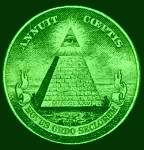Pyramid scheme
A pyramid scheme is a tried-and-true technique to involve large numbers of people, to get work done, and to make a ton of money without doing any of the work yourself. It involves promising recruits large amounts of earnings and/or influence, provided they recruit even more people. It is self-evident that the pyramid scheme is very similar to life at Uncyclopedia or at any large company, such as Ford Motor Company.
History[edit]
The first pyramid scheme was invented by the Egyptians. King Tutankhamen was famous not only for getting a large number of condoms named after him, but for inducing an even larger number of Egyptian citizens to build a large building that was both pointed and pointless. The Dead Sea Scrolls tell us that King Tut promised each new hire that he could retire with full pension if he merely talked ten other brawny individuals into taking his place.
Unfortunately, late participants were unable to find anyone receptive to the above offer, proving the First Law of Commerce: No one is into it, once everyone is onto it.
Controversy[edit]
Wikipedia advises its readers in the first sentence that a pyramid scheme is an "unsustainable business practice." This would be the same organization that induces thousands of people to spend entire weekends editing for no pay, and whose articles portray fracking as an "unsustainable business practice" as well, while seeing nothing unsustainable about writing Environmental Impact Statements at taxpayer expense.
Clearly, Wikipedia has a clandestine motive to try to get its readers to resist alternative pyramid schemes so as not to deplete its own pool of free talent.
Are all wikis pyramid schemes? This author does not believe so. He is an Admin, as you can be too, provided you do exactly what he tells you, and it would not hurt to recruit ten of your playground pals.
Famous pyramid schemes[edit]
Digital Equipment Corporation[edit]
"DEC" was a computer company whose pencils all said, beguilingly, REFER A FRIEND, to recruit them into a cult society whose enigmatic leader thought the personal computer was a joke. Its own devices were creative, provided the owner got a Ph.D. in how to operate one, and never confused the manuals for metropolitan telephone books. It would ultimately be bought by Compaq, which would be bought by Hewlett-Packard. These were both paper transactions that generated billions of dollars without anyone having to do any real work.
Hillary Rodham Clinton[edit]
Wikipedia describes "Women Empowering Women" as a classic pyramid scheme. Clearly, the perennial political campaigns of Hillary Clinton are this very thing. Every four years, she promises her overwhelmingly female recruits that they will attain new political power by simply giving Hillary more of it. The shameless campaigns use manipulative techniques to get the female recruits to recruit more women. It does not occur to the ladies at the bottom of this pyramid that, once they start going door-to-door themselves, there will be nobody home.
Multi-level marketing[edit]
Corporate America has adapted the pyramid scheme toward useful work, as it earlier did with the Hudson River and the American Indian. When the Amway salesman comes to your home with gallon jugs of nondescript cleaning fluid, it is clear that his real goal is to recruit you in his place and retire on the commissions he can skim off your effort. Unfortunately, like any pyramid scheme, with increasing success comes a depleted pool of suckers, especially once it becomes evident that the cleaning fluid makes a much better paint thinner.
The Great Seal of the United States[edit]
The pyramid on the back of the one-dollar bill commemorates the fact that, since the days of Founding Father Richard Nixon, there has been no guarantee that the dollar is worth anything at all, and since the days that House Speaker John Boehner declared he'd rather carry a purse than exercise the Power of the Purse, there is utterly no upper limit on the number of these things that would be printed. Like any other pyramid scheme, the last people left holding the money "bag" will find themselves with nothing except kindling.



